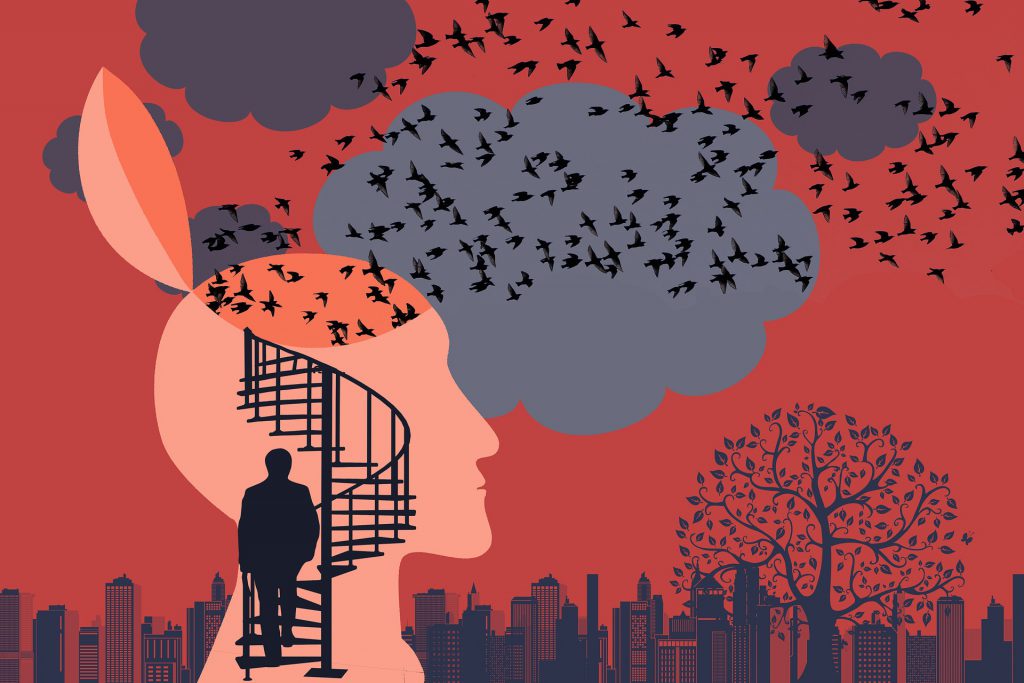
With four new consulting psychologists as of March 2022, IISc’s team of counsellors has expanded significantly to six. We spoke to Shridhar BG and MS Savitha, both clinical psychologists who have been counselling IISc students on campus since 2018, and are part of the team of mental health professionals (including psychiatrists and wellness coordinators trained in crisis intervention) who make up IISc’s Wellness Centre. In this interview, they explain what counselling and therapy are, and bust some misconceptions about addressing problems with mental health.
What is counselling?
Shridhar: For me, counselling is more about helping someone build themself from within when they are facing a conflict or a problem. People often think that a therapist or a counsellor gives advice, but that isn’t true – that’s the last thing we do. We try to get them to look within, so that they can start looking at this problem with a different perspective and find a solution. Most of the time the individual will have their own solutions, but sometimes, in a particular scenario, they may not be able to find it themselves because they might be stressed, or anxious, or depressed. So in counselling, we try to pose questions that can make them examine and rethink their perspective, and help them figure out a workable solution.
Is therapy the same as counselling?
Shridhar: It is different. In counselling, we ask questions and try to dive within. Counselling is useful in dealing with conflicts that come up in our day-to-day activities, where there may be difficult choices to be made. Therapy is slightly more complicated, and is used when there is some deeper trouble. In therapy, we might follow a particular school of psychology and use certain techniques to help someone modify certain behaviours or thoughts. Behaviour is learned – and anything you learn, you can unlearn. We might give our clients a bit of homework (in the form of recommendations for behavioural changes, or maintaining a diary) when it comes to therapy.
Savitha: In counselling, someone might be trying to work through a problem and we help them resolve that problem. In therapy, we go a little deeper. We chat with the client to get a sense of their case history, and we might suggest some steps they can follow, based on the schools of psychology we use. It depends on the severity of the issue. If they are facing a situation to which they have a specific response such as mild anxiety, without a history of it, then we might use counselling. But if it seems like the client has had similar experiences in the past to which their response has been to feel very anxious, and if the impact on them is severe, then we might shift to using therapeutic techniques to help them.
What happens in a typical counselling session?
Shridhar: The first session usually starts with a greeting, and we introduce ourselves. We gather information about the individual and try to build a rapport. Building that rapport is very important in order to get a person to open up to us. Then we ask about the reason that they have come to us, and try to see – based on the severity of their issue, and their ability to perform day to day activities – whether to go in for counselling, therapy, or refer them to a psychiatrist. If we do feel a psychiatrist needs to chip in, we let them know why we are referring them to one.
What is the difference between a counsellor and a psychiatrist?
Shridhar: As counsellors and therapists, we try to deal with problems or certain behaviours with counselling methods and therapeutic modules. We do not prescribe medication. Psychiatrists deal with these by prescribing medication if it is required.
How long does a course of counselling usually last?
Savitha: There is no time limit as such, it depends on the severity of the issue. Sometimes things may get resolved with 3-4 sessions of counselling. But when it comes to therapy, it can take a little longer as they usually involve a few structured sessions. Sometimes we have an assessment between the sessions. Based on the client’s improvement, we decide whether to continue with therapy or not.
Who needs counselling or therapy?
Savitha: Any person facing a situation that is impacting them adversely, affecting their daily activities, affecting their relationships, or affecting their decision-making skills. Sometimes the impact of these situations is severe, and sometimes not. Often the person is able to handle the situation and take care of most aspects, but there may be one that they might need help with.
Shridhar: Any normal person needs it. To be very frank, we cannot counsel a person who is not sane. Counselling is for a person who has to navigate a difficult scenario, and might be feeling stuck.
“Counselling is for a person who has to navigate a difficult scenario, and might be feeling stuck”
In your experience, what are some of the most common reasons why people seek counselling on campus?
Shridhar: To start with, it is usually academic issues, and stress related to academic issues. We also see people with anxiety, depression, and relationship issues. When I say relationship, this can be with their academic advisor, their parents, their friends, or their partner. But the most common ones are academic situations.
Savitha: In my experience it is the same – I mostly see issues with academics, anxiety, depression and interpersonal relationships.
Are these issues the same for most people, irrespective of gender?
Savitha: Yes, these are the most common issues for people that we are seeing.
Some people think that seeking counselling is unnecessary because they have already spoken to their friends about their problems. What do you think counselling brings to the table that is different from sharing with friends and family?
Shridhar: Usually, when a family member or friend shares something with us, we are so emotionally attached that we are just looking for ways to protect the person in whatever way possible. It is an emotional and subjective approach, rather than an objective one. With a counsellor or a therapist, it’s about you looking into things in a more objective way, choosing the most workable solution, and getting started with it.
Savitha: A counsellor’s approach is a more objective one. To friends or family we may not be able to say what we truly feel, or we might say what we think the other person wants to hear. As professionals, we don’t give advice. We guide people to find their own solutions.
What do you think are some of the biggest reasons that people are hesitant to reach out to a mental health professional?
Shridhar: Even though a psychiatrist is different from a therapist, people often confuse the two. They feel that if they meet a therapist they will have to take medication. They are not okay with taking medication, but are fine with attending counselling sessions. So, I think it is mostly related to the taboo attached to taking medication for mental health issues. Also, it could be that they had a prior negative experience with a mental health professional, or just a case of judging the process too quickly.
The stigma around mental health means that students sometimes do not wish to engage with us. Sometimes they are referred to us by their friends and when we reach out to the student, they are not receptive to us. The moment they hear the term psychology or psychiatry, they shut down.
Savitha: Many people assume that psychiatric medication is addictive. They may also believe that seeking counselling would mean they are weak-minded, or “mad” or “crazy”. Perhaps they worry that people around them will begin to look at them differently. Or they think, if I have any kind of emotional outburst, people will say, oh, now she needs to be admitted in a hospital, or something to that effect.
Most of the time students don’t tell their faculty advisors that they are seeing a psychiatrist or a counsellor, as they are worried that they will be treated differently from their colleagues
Another thing I have observed is that most of the time students don’t tell their faculty advisors that they are seeing a psychiatrist or a counsellor, as they are worried that they will be treated differently from their colleagues. They are worried that they won’t be given important tasks, or that the professor will complain that they can’t shout at them because then that will make them anxious. They are very scared that if their professor finds out, it will not be kept confidential and their reputation in the lab will go down, and their friends will look at them differently. Some of the students even hide it from their family members, because they are scared their parents will think that they haven’t been raised properly. There is still a huge stigma around mental health, even among so-called educated people, and we see it in IISc too.
Since you joined the Institute, have you seen students more willing to reach out over time?
Shridhar: I’ve been here for almost three and a half years now. At the start, we hardly had any sessions, but now the numbers speak. On an average we have around 8 to 10 between us each day. That’s a huge number for an educational institute. So yes, students are reaching out. That’s a wonderful thing.
However, one concern we have is that people might have had a negative experience with a therapist in the past, and because of this they give up on therapy or counselling altogether. We just want them to give it another chance, even if it is not with us. It’s not like therapy involves medication, and there is free will here – you can always back out if you are not okay with the therapist. I am very sure there is no therapist or counsellor who can deal with all issues. It depends on the rapport that is built, and if the person is not comfortable with the therapist, they can always find someone else that they are comfortable with. Sometimes if we ourselves feel that the counselling or therapy is not working, we let the individual know this. I hope people give it another chance and use the facilities available to them – there are other means of accessing mental health services at IISc [such as the online portal YourDost, or reimbursements for counselling or psychiatry sessions off campus] than coming to us.
We also see very little participation from students when we run surveys, and that doesn’t help us get an accurate picture. More student participation will help us come up with new modules based on this information, something we are looking forward to creating.
If there was someone who is considering seeking counselling but might be scared to reach out, what would you say to them?
Shridhar: I would say, please reach out to us, and if you are worried about confidentiality, rest assured. We are bound by a code of ethics to maintain confidentiality, unless instructed by the client. We would also like your feedback on the process, and ask if your expectations are being met. Together, I think we can build a stronger community. It’s about working together, no matter what we do.
Savitha: To add to that, I want to say, you might have some thoughts about therapy – you might think this therapy or this medication is for weak-minded people. Or maybe you might have heard from others that going to a psychologist or a psychiatrist is not a good thing, and that you have to deal with your problems yourself. Honestly, sometimes we cannot deal with certain problems, sometimes the situation is overpowering, and we are unable to overcome it without a little help. When you come to a mental health professional, it is not like we force you to do something. We will only discuss the best way to solve your problem, or suggest coping mechanisms to handle certain situations, so that next time you face something similar, you will be able to handle it well. It’s about identifying the problem and understanding yourself, in a space where no one will judge you.
Shridhar, Savitha and four more consulting psychologists can be contacted through IISc’s Wellness Centre.




